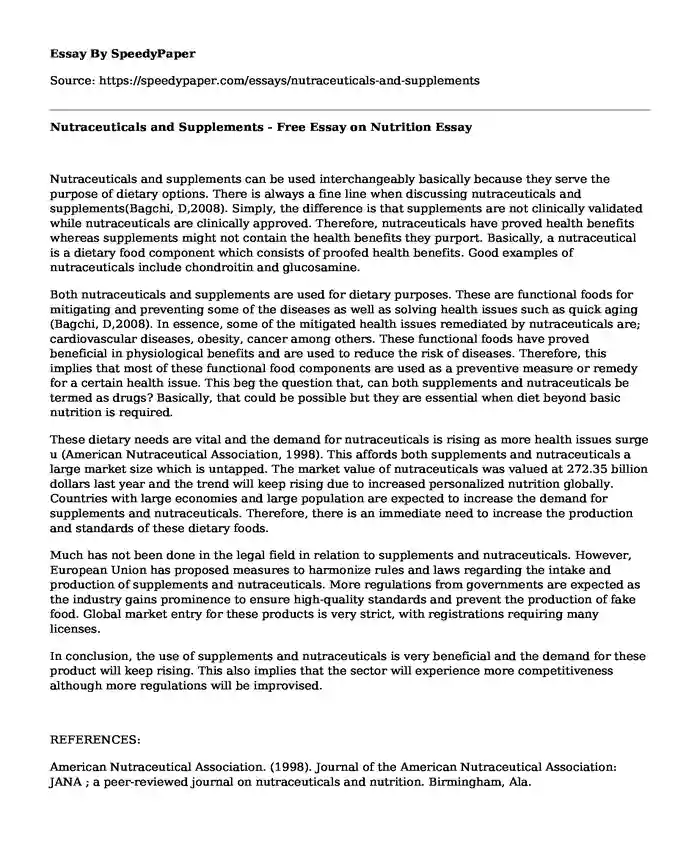Nutraceuticals and supplements can be used interchangeably basically because they serve the purpose of dietary options. There is always a fine line when discussing nutraceuticals and supplements(Bagchi, D,2008). Simply, the difference is that supplements are not clinically validated while nutraceuticals are clinically approved. Therefore, nutraceuticals have proved health benefits whereas supplements might not contain the health benefits they purport. Basically, a nutraceutical is a dietary food component which consists of proofed health benefits. Good examples of nutraceuticals include chondroitin and glucosamine.
Both nutraceuticals and supplements are used for dietary purposes. These are functional foods for mitigating and preventing some of the diseases as well as solving health issues such as quick aging (Bagchi, D,2008). In essence, some of the mitigated health issues remediated by nutraceuticals are; cardiovascular diseases, obesity, cancer among others. These functional foods have proved beneficial in physiological benefits and are used to reduce the risk of diseases. Therefore, this implies that most of these functional food components are used as a preventive measure or remedy for a certain health issue. This beg the question that, can both supplements and nutraceuticals be termed as drugs? Basically, that could be possible but they are essential when diet beyond basic nutrition is required.
These dietary needs are vital and the demand for nutraceuticals is rising as more health issues surge u (American Nutraceutical Association, 1998). This affords both supplements and nutraceuticals a large market size which is untapped. The market value of nutraceuticals was valued at 272.35 billion dollars last year and the trend will keep rising due to increased personalized nutrition globally. Countries with large economies and large population are expected to increase the demand for supplements and nutraceuticals. Therefore, there is an immediate need to increase the production and standards of these dietary foods.
Much has not been done in the legal field in relation to supplements and nutraceuticals. However, European Union has proposed measures to harmonize rules and laws regarding the intake and production of supplements and nutraceuticals. More regulations from governments are expected as the industry gains prominence to ensure high-quality standards and prevent the production of fake food. Global market entry for these products is very strict, with registrations requiring many licenses.
In conclusion, the use of supplements and nutraceuticals is very beneficial and the demand for these product will keep rising. This also implies that the sector will experience more competitiveness although more regulations will be improvised.
REFERENCES:
American Nutraceutical Association. (1998). Journal of the American Nutraceutical Association: JANA ; a peer-reviewed journal on nutraceuticals and nutrition. Birmingham, Ala.
Bagchi, D. (2008). Nutraceutical and functional food regulations in the United States and around the world. Amsterdam: Elsevier/Academic Press
Mahgoub, S. E. O. (2016). Genetically modified foods: Basics, applications, and controversy.
Cite this page
Nutraceuticals and Supplements - Free Essay on Nutrition. (2022, Mar 04). Retrieved from https://speedypaper.com/essays/nutraceuticals-and-supplements
Request Removal
If you are the original author of this essay and no longer wish to have it published on the SpeedyPaper website, please click below to request its removal:
- Law Essay Sample: Legal Systems in Africa
- Essay Example on Brand Management Strategies
- Annotated Bibliography on How to Start a Business, Free Paper Example for Students
- Essay Sample Analyzing the Failure of the REACH Project
- Why Do We Need Sleep? Free Essay for You
- Essay Sample on The OPM Incident
- Essay Example. The New York Nurses Association's Position on Abortion
Popular categories





